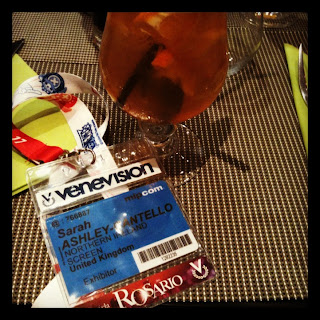
Without a day
to spare, ‘One Night’ was completed in time for its’ premiere on October 18
2012 at the third annual Belfast Media Festival. Shown at a session held by
Creative Skillset to introduce ‘The Next Generation’ within Northern Ireland’s
media industry, ‘One Night’ coupled with ‘One Fortnight: the Making of One
Night’ was met with positive feedback.
The two films
created a launch pad from which Creative Skillset, BBC NI and NI Screen announced
the second intake of Aim High trainees next year. Slightly adapted from our 18
months, the second round of entrants will undoubtedly have as valuable an
experience as we have.
Oscar-winning
and highly acclaimed writer and director Terry George was also in attendance.
The 15 Aim High trainees waited with baited breath to hear his thoughts on our
wee film, and to our great delight he was complimentary! The director described
short films as a “calling card” to be used to demonstrate what a filmmaker is
capable of. This perspective was very welcome as I had thought that short films
were often met with an air of snobbery by other TV or feature filmmakers.
We were
extremely lucky to have an hour of conversation with Terry after the screening.
He used appropriately imaginative metaphors to pass on advice to us. He
compared films to cornflakes; some are the All Bran kind that you don’t really
enjoy but are good for you. Others are coated in sugar, and some boxes are just
empty. So when we’re making films, we should remember that we’re always making
cornflakes… Terry’s key point was to always remember that cornflakes, sorry I
mean, films must be entertaining (tasty).
 Terry also
reflected on the crucial importance of telling the story. Writers he says, are
the only ones who can start from the end and work backwards because they’re the
only ones who really know what’s meant to happen. He also expounded on the
importance of the relationship between a director and their Director of
Photography.
Terry also
reflected on the crucial importance of telling the story. Writers he says, are
the only ones who can start from the end and work backwards because they’re the
only ones who really know what’s meant to happen. He also expounded on the
importance of the relationship between a director and their Director of
Photography.
Terry was
patient and encouraging in his conversation with us. His anecdotes of working
with the likes of Jim Sheridan, Daniel Day-Lewis and Denzel Washington, and crossing
paths with the men whose lives inspired his films, Gerry Conlon and Paul
Rusesabagina, were entertaining and witty.
The rest of the
Belfast Media Festival followed in a similar style, with keynote speeches and
panel discussions packed full of information, advice and even self-mocking
commentary on the media industry today as well as hopes for future developments.
 ‘One Night’ and
‘One Fortnight’ are two films that we deserve to be proud of. Made with
industry-standard production values and a personal dedication that only come to
a group of young friends making their first film together, we were all happy
with the end results. There were hair-raising, headache-inducing, and fretful
moments throughout production but that makes the final films even more
rewarding.
‘One Night’ and
‘One Fortnight’ are two films that we deserve to be proud of. Made with
industry-standard production values and a personal dedication that only come to
a group of young friends making their first film together, we were all happy
with the end results. There were hair-raising, headache-inducing, and fretful
moments throughout production but that makes the final films even more
rewarding.
Stills from the
shooting weekend, news and updates on the film can be found at the facebook page.
Stills by Pete Graham.


